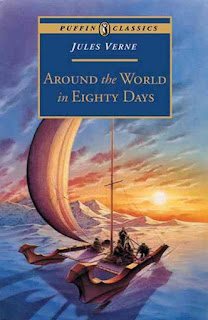Around the World in Eighty Days - Jules Verne
First published in French, 1872.
My second Jules Verne book on this blog. I began reading this one, was surprised by the level of humour involved, and decided to keep it to read with Elise once our previous book had been finished. I'm glad I did.
Most of us probably have some idea of the plot of Eighty Days, probably through having seen a movie version - the most recent one being the Jackie Chan one - and there are certainly a number of the major beats of those films in the book. But, as is the case with many adaptations of older adventure books, a movie is developed to be more 'cinematic', and therefore bigger in scale than its source material. In terms of Eighty Days, that means that the movie versions cram in more locations and more modes of transport, whereas the book mostly focusses on passenger liner ships and trains. Phileas Fogg also has carefully plotted his course to be the most direct route possible, and hardly varies from that in the book at all, meaning that the number of locations is limited as well (though still, of course, being spread literally around the globe).
With such a 'straightforward' plot, it might seem as though Eighty Days could be a boring read. However, Verne does manage to create a level of interest - less through Phileas Fogg himself (who is quite methodical and emotionless as a character) and more through the supporting characters, particularly the emotional Frenchman Passeportout, as well as a detective, Fix, who is convinced that Fogg fits the description of a wanted criminal and is determined to halt his progress at every turn. There are a few twists at the end of the story that also add some uncertainty, although anyone who has seen any version of the story on screen will probably have an idea of one of the biggest.
There is description of most of the locations visited, which adds something to the narrative - it becomes a snapshot of these locales at the time of the writing. It also becomes somewhat of a reflection on the stereotypes of the day, with Americans in particular (and among Americans, Mormons even more so) getting portrayed in a humorous and vaguely dismissive way.
Jules Verne generally writes interesting stories, but I also have often found them rather 'dry.'
This story proves to be an enjoyable exception to that.
Completed with Elise, 24 October 2021.
(Elise Books)




Comments
Post a Comment